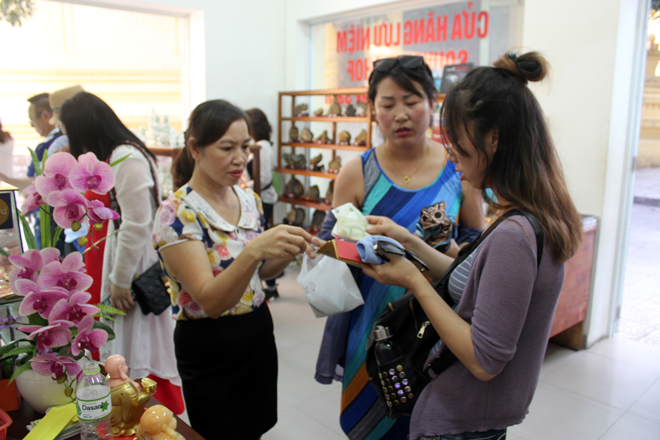Tightening management of online payments by foreign tourists
Recently, Da Nang has seen an increasing appearance of so-called zero-dong tours which has resulted in such issues of deep concern as illegal foreign currencies transactions, and direct payment arrangements between sellers and buyers without the involvement of any Vietnamese banks.
 |
| It is high time to tighten the management of online payments by foreign tourists during their stay in Da Nang |
These arching matters mentioned above are posing a challenge for relevant local agencies: how to ensure a fair and healthy competitive business environment, and reduce tax losses to the city budget in the coming time.
In particular, there have been a number of Chinese-owned businesses using POS (point-of-sale) machines or e-wallets issued in China to receive RMB payment from Chinese tourists while they are in Vietnamese localities. This is a serious breach of the Vietnamese laws.
Due to prices listed and payment accepted in foreign currency in the territory of Viet Nam, it has caused direct money flows from buyers’ bank cards or e-wallets to that of the sellers in the China territory only without flowing into Viet Nam, and has resulted in unmanageable transactions as well as tax losses.
The Vietnamese authorities have discovered some cases of RMB being paid through Chinese-issued POS payment machines without going through banking system or payment intermediaries in Viet Nam.
VIMO is now the first and only licensed Payment Intermediary in partnership with both WeChat Pay and Alipay without equity capital involved. This has grown acceptance of legal Cross-Border Electronic Payments through e-wallets for Chinese and South Korean tourists when they travel to, and make payments at stores in Viet Nam, for which VIMO has reported and submitted dossier to the State Bank of Viet Nam.
Accordingly, when a tourist uses a foreign e-wallet application to pay at Vietnamese stores, VIMO requests the foreign e-wallet company to deduct the payment amount from tourist's account, then credit into VIMO e-wallet of the Vietnamese vendor in Viet Nam, in accordance with applicable laws and regulations. When the reconciliation period comes around, the foreign e-wallet company will transfer the outstanding balance to VIMO’s bank in Viet Nam, bringing about significant source of foreign currency to the country.
 |
| Tourists purchasing souvenirs in the city |
To date, no illegal online payment activities have been reported in Da Nang. However, the city authorities should take preventative measures in the current context of growing number of foreign visitor arrivals to the city.
According to Mr Le Son Phong, the Deputy Director of the municipal Department of Information and Communications, in terms of theoretical points of view, it is possible to use IT tools to extract information from the IP packet to identify source and destination IP addresses, and use a port which is an endpoint of communication in an attempt to block such illegal transactions.
In the coming time, the municipal Department of Information and Communications will work closely with telecoms operators to localise sites where multiple transactions with foreigners are usually conducted in order to detect and handle suspicious transactions.
Mr Vo Minh, the Director of the city’s branch of the State Bank of Viet Nam (SBV) said stronger measures will be taken to stop illegal foreign exchange transactions, and the use of POS machines or such popular mobile payment apps as WeChat Pay and Alipay to make purchases at shopping facilities.
Offering another perspective, Mr Nguyen Ha Bac, the Deputy Director of the Department of Industry and Trade said his agencies has actively been engaged in requiring transport service providers and shops to publicly display their prices and ensure that their products are being sold at the displayed prices.
Mr Nguyen Dinh An, the Head of the Municipal Taxation Department, revealed that, over recent months, his unit has detected and dealt with shops serving foreign tourists for committing such violations as refusing to issue receipts or commercial invoices, and making inaccurate declarations of revenues.